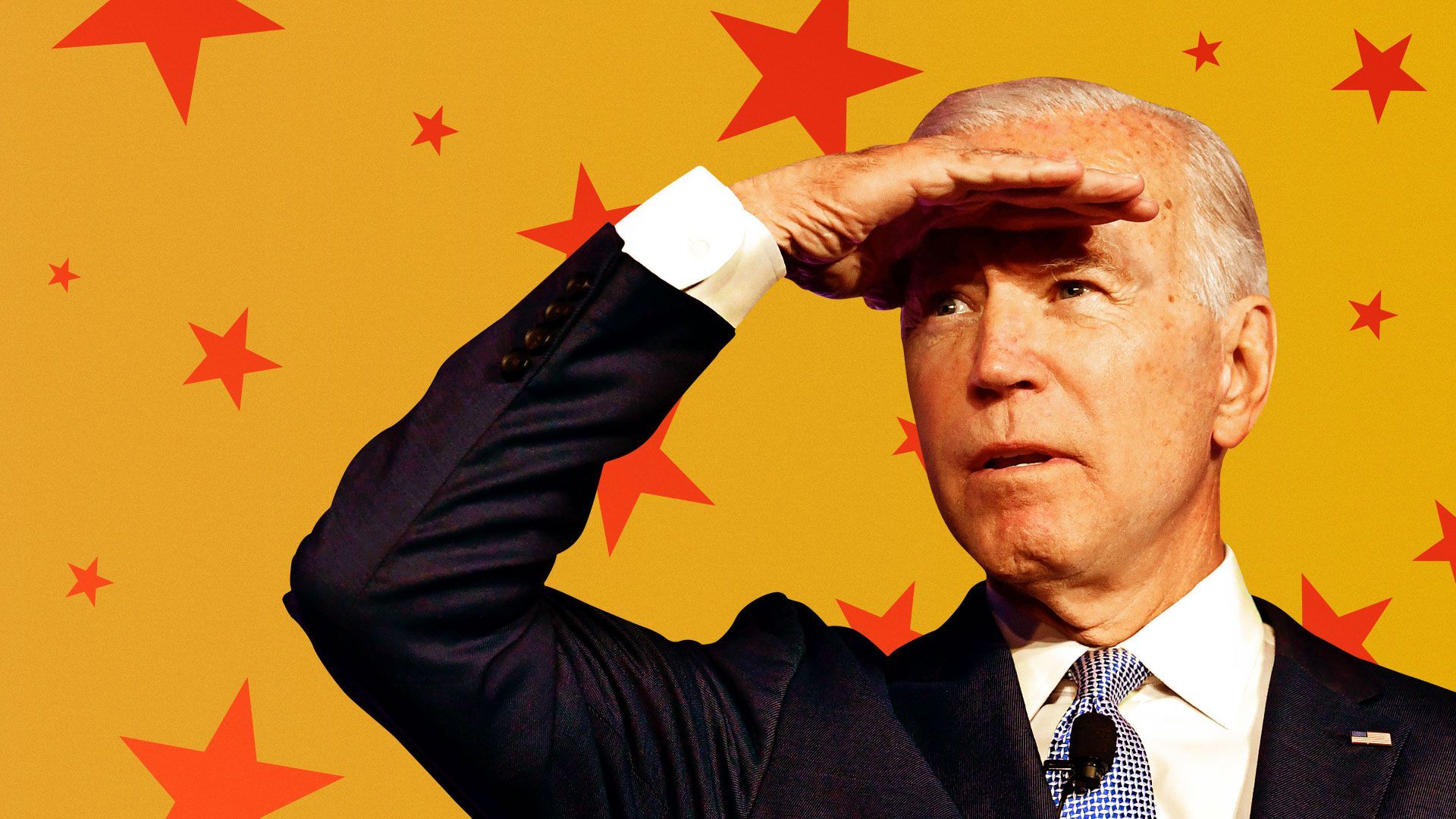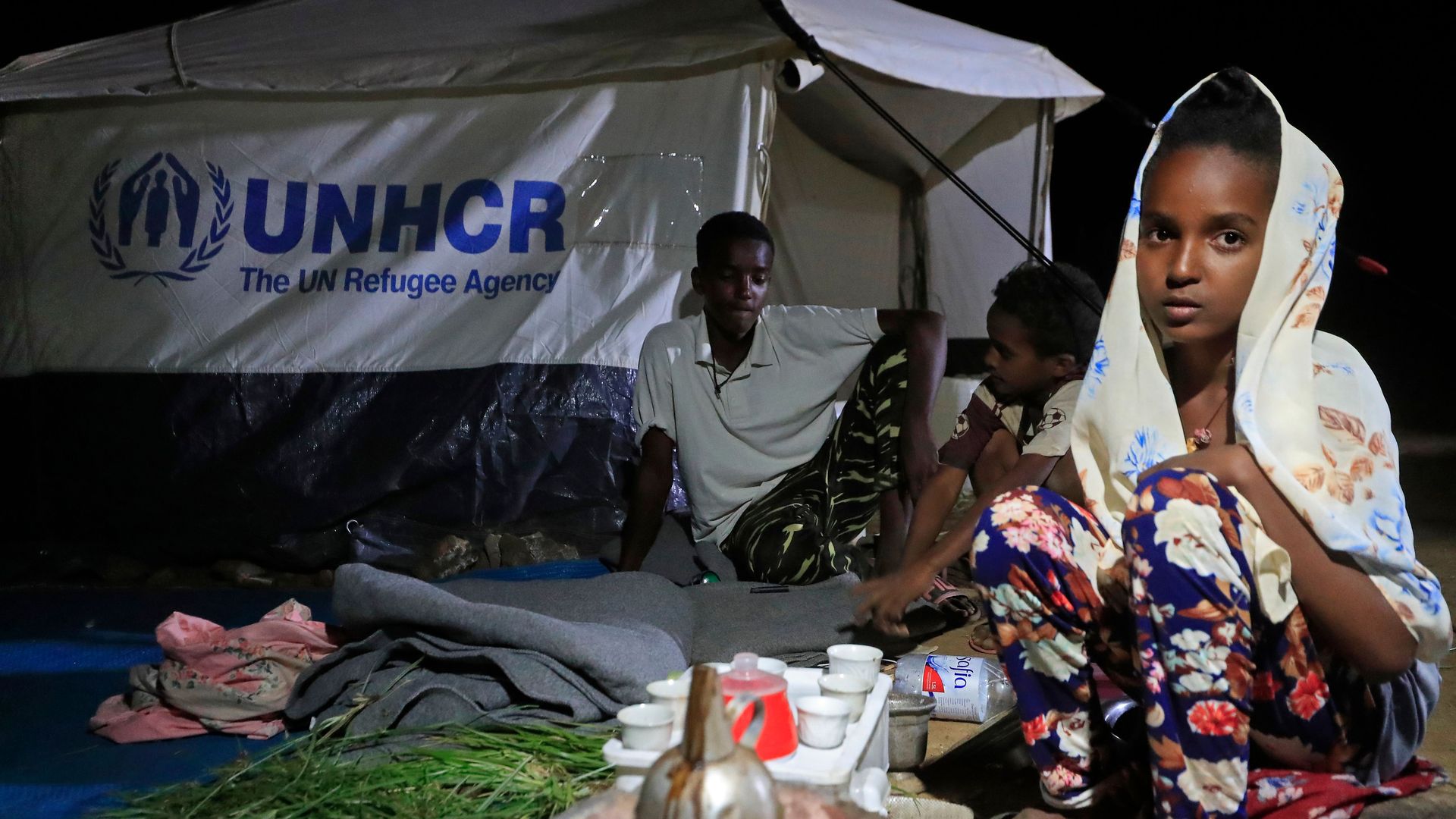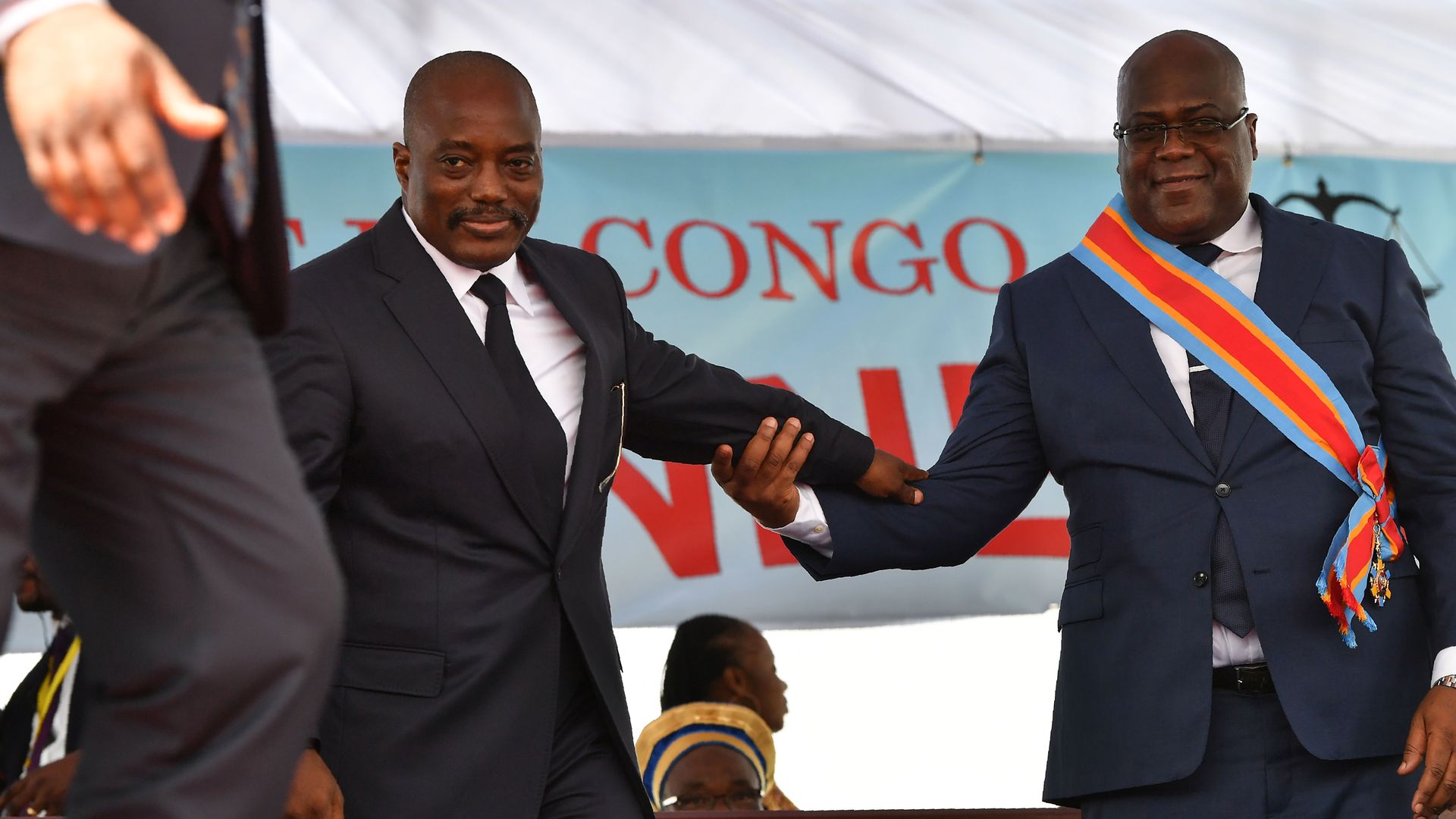| | | | | | | Presented By Raytheon Technologies | | | | Axios World | | By Dave Lawler ·Feb 11, 2021 | | Welcome back to Axios World. - Tonight we're eavesdropping on the Biden-Xi call then tracking a war in Ethiopia, a charm offensive from Saudi Arabia and a power struggle in the DRC (1,662 words, 6 minutes).
- Heads-up: We're off on Monday, so I'll see you next Thursday. Hope you have a great weekend.
New arrival? Sign up | | | | | | 1 big thing: Biden's plan to compete with China |  | | | Photo illustration: Eniola Odetunde/Axios. Photo: Frederic J. Brown/Getty Images | | | | The leaders of the world's two most powerful countries spent two hours on the phone last night discussing the crackdown in Hong Kong, the apparent genocide in Xinjiang, nuclear weapons, climate change and more. The big picture: The last 24 hours — in particular, a briefing to reporters ahead of the call on Biden's China strategy — have given us the best forecast to date for the course of U.S.-China competition over the next four years. Seven key takeaways: 1. The Biden administration accepts Donald Trump's basic proposition that the U.S. is now engaged in an all-out competition with China across trade, technology and security, and that America's foreign and domestic policies must be oriented accordingly. - But they think Trump weakened America's position by disregarding alliances, failing to speak up for democracy and human rights, and allowing China to fill power vacuums in international institutions.
2. Biden's strategy revolves around confronting China in partnership with countries in Asia and Europe — particularly the other "Quad" countries (Australia, Japan and India) on security issues and European allies on trade and investment. - That won't be easy, as few of America's partners are fully prepared for the "intense strategic competition" with China that the White House envisions.
3. Trump's tariffs are the new "baseline," a senior administration official said, though the administration expects to adjust them going forward. 4. The Biden administration is attempting to build bipartisan consensus around state investments in industries like semiconductors, artificial intelligence, biotech and clean energy "to make sure that we're maintaining our edge" on China. 5. The U.S. is continuing freedom of navigation missions in the South China Sea and Taiwan Strait, and it doesn't expect to reduce its troop count in Asia, as Trump had suggested. 6. Climate change is one of the few areas where the White House sees any opportunity for positive engagement with China. Beyond that, their initial focus is much more on competition than cooperation. 7. The leaders committed to keeping lines of communication open, according to the White House. Contacts were held mainly through trade negotiators by the end of Trump's term. What they're saying: Biden summed up his view from the Oval Office today: "If we don't get moving, they're going to eat our lunch." - Biden added that the call had been a "good conversation" between two leaders who know each other well due to their many interactions while Biden was vice president.
- The other side: Chinese state media has largely focused on the positive — that the call reflects China's importance in the eyes of Washington.
- The Xinhua state news agency quoted Xi as telling Biden: "Cooperation can help the two nations and the world to accomplish big things, while confrontation is definitely a disaster."
What to watch: Senior administration officials said it would be crucial over the next six to eight months for the U.S. to get its economy back on track, restore its credibility among partners in Asia, and build the foundation of its long-term China strategy. - Failure to bounce back from the pandemic downturn and place the right bets in key industries, one said, would doom the broader China strategy to failure.
|     | | | | | | 2. Ethiopia: Tigray war becomes humanitarian nightmare |  | | | Child refugees who fled the conflict in Tigray. Photo: Ashraf Shazly/AFP via Getty | | | | 100 days into a military campaign in Ethiopia's northern Tigray region, Prime Minister Abiy Ahmed is attempting to soothe international concerns about alleged war crimes and the grave humanitarian toll. The state of play: Abiy's offensive quickly succeeded in removing the Tigray People's Liberation Front (TPLF) from power in the regional capital, Mekelle. Federal troops are now attempting to hunt down the leaders who fled and stave off an insurgency. - The TPLF had been the driving force in national politics before Abiy's rise to power in 2018, and it continued to challenge his authority from its regional power base. Abiy argues that the war was necessary to preserve national unity.
- A telecommunications blackout and ban on journalists have largely kept the eyes of the world off the conflict, but it's clear the fighting has been brutal. Forces on both sides have been accused of horrific abuses, including mass rape.
- More than 200,000 people have been internally displaced, and 60,000 have fled to neighboring Sudan.
- The International Red Cross says 80% of Tigrayans — some 5 million people — are cut off from humanitarian aid, and there's a growing risk of mass starvation.
What he's saying: "I cannot deny that the removal of the TPLF has fueled unease in the international community," Abiy writes. "Concerns about ethnic profiling in Tigray and obstacles to humanitarian relief abound." - "Ending the suffering in Tigray and around the country is now my highest priority."
What to watch: Abiy is now known as much for this war as for his Nobel Peace Prize. Elections later this year will be his first time on the ballot and the biggest test to date for the nascent democracy in a deeply divided country. |     | | | | | | 3. Saudi Arabia releases activist, attempts reset with Biden |  | | | Lina al-Hathloul tweeted a photo of her video call with her sister Loujain after Loujain was released from prison. Photo: AFP via Getty. | | | | Saudi women's rights activist Loujain al-Hathloul is in good spirits but determined to bring those responsible for torturing her to justice, her sisters Lina and Alia told reporters today, a day after Loujain's release following 2.5 years in prison. The backstory: Even as Crown Prince Mohammed bin Salman (MBS) moved to allow Saudi women to drive, he jailed one of the most prominent activists for those rights. Hathloul now faces three years of probation. She and her siblings, who have left Saudi Arabia, are all subject to a travel ban. What they're saying: "Of course Saudi Arabia's situation is tightly connected to what's going on in the U.S.," Alia said. - "It is a fact that Loujain was in prison during the previous administration and it was really hard to get anything, and it is a fact that she was released a few weeks after Biden's arrival to power. Without international pressure, we cannot obtain something in Saudi Arabia."
Between the lines: The Saudi government is trying to avoid a crisis with Biden over human rights as well as the war in Yemen. - Also on Wednesday, Saudi Foreign Minister Faisal bin Farhan met in Riyadh with the new U.S. envoy for Yemen, Tim Lenderking.
Flashback: On the campaign trail, Biden accused MBS of ordering the murder of Jamal Khashoggi, stressed that he wouldn't sell weapons to the Saudis, and promised to "make them the pariah that they are." - Now in office, Biden has frozen an arms deal with Saudi Arabia, announced the halt of U.S. support for offensive operations in Yemen, and rolled back Donald Trump's designation of Yemen's Houthi rebels as a terror group.
The other side: The Saudis haven't criticized Biden's moves publicly, and they're trying to navigate the new reality through private talks with the administration, Axios' Barak Ravid reports. |     | | | | | | A message from Raytheon Technologies | | Raytheon Technologies is creating intelligent space technologies | | |  | | | | From missile warning to weather information, Raytheon Technologies is creating space-based technologies that are essential for global commerce, scientific discovery and national security. That's the future of aerospace and defense. Learn more at RTX.com. | | | | | | 4. Africa: Tshisekedi pulls ahead in DRC's power struggle |  | | | An awkward grip: Kabila (L) at Tshisekedi's inauguration in Jan. 2019. Photo: Tony Karumba/AFP via Getty | | | | Félix Tshisekedi has been on a good run. Driving the news: The president of the Democratic Republic of the Congo took over the chairmanship of the African Union this week. Days earlier, he won a major victory in an ongoing power struggle with his predecessor, Joseph Kabila, by convincing a large swath of parliament to leave Kabila's camp and vote out the speaker, a Kabila ally. The backstory: Tshisekedi is something of an accidental president. He was declared the winner of the DRC's December 2018 elections despite independent observers believing another candidate, Martin Fayulu, was the clear winner. - Most believed Kabila — who spent 18 years in office and effectively controlled the electoral commission — struck a backroom deal to elevate Tshisekedi while ensuring he'd retain a large slice of power after stepping down.
- That compact has eroded over time. On Jan. 27, it appeared to crumble entirely.
How it happened: One MP told the Economist that "money circulated" as his fellow parliamentarians were convinced to switch sides, but that they'd been offered even more money to stay put. - Many seem to base their calculus on the fact that Tshisekedi has the power to dole out patronage to allies and investigate foes for corruption — making him a better friend to have.
- Tshisekedi is becoming a more powerful president than many expected, but he has not yet proved a particularly effective one in terms of delivering promised economic and political reforms, per the Economist.
Worth noting: The U.S. and European countries — happy to see the back of Kabila and hoping for some stability — largely ignored the fact that the 2018 election was rigged in Tshisekedi's favor. |     | | | | | | 5. Global news roundup |  | | | Protests in Yangon, Myanmar. Photo: Santosh Mmr/SOPA Images/LightRocket via Getty | | | | 1. Initial findings by a WHO team in China investigating COVID-19's origins appear to echo Beijing's talking points, Axios' Bryan Walsh writes. - On the one hand: Based on their preliminary findings, the team said it was "extremely unlikely" that the virus originated in a lab.
- On the other: They left open the possibility that the virus originated outside China, coming into the country via contamination of frozen food.
- There's even less known evidence for that hypothesis than a lab leak, but it is one that has been embraced by Beijing as it seeks to downplay its early failures to contain COVID-19.
2. The appointment of a political figure with links to Turkey's ruling party as the rector of a prominent Istanbul university has sparked protests and raised concerns about deepening political intervention in higher education, Menekse Tokyay writes for Axios from Ankara. - President Recep Tayyip Erdoğan was in 2016 given the authority to appoint university staff by decree, and he used that power last month to appoint the rector of Bogazici University, known as Turkey's Harvard.
- The appointment sparked peaceful protests from students and faculty members. Erdoğan has described the students as "terrorists," and police have cracked down with hundreds of arrests.
3. The Biden administration today targeted 10 of Myanmar's current and former military leaders for their roles in the recent coup. - Biden has promised further action if the military continues to detain political leaders and squash protests.
- Yes, but: The junta appears to have a higher tolerance for sanctions than democracy.
|     | | | | | | 6. One to watch: Boycotting Beijing 2022? |  | | | Illustration: Aïda Amer/Axios | | | | Global fears of China's authoritarian rise are overshadowing the upcoming 2022 Winter Olympic Games in Beijing and sparking calls for a boycott, Axios' Bethany Allen-Ebrahimian and Kendall Baker write in a special report. - Democratic governments worry that allowing Beijing to host the Olympics without protest would further entrench China's authoritarianism domestically and abroad.
- The U.S. and its partners are also concerned about the rise of China as a rival amid a growing sense of democratic vulnerability, imbuing the 2022 Games with a new undercurrent of geopolitical fear.
Go deeper |     | | | | | | 7. Stories we're watching |  | | | Patrolling the streets amid gang violence in Buenaventura, Colombia. Photo: Luis Robayo/AFP via Getty | | | - Biden's shadow diplomats sweep back to power
- Iranian spying operation targets dissidents
- ICC probe pulls Biden into Israel-Palestine conflict
- Netanyahu tries to delay corruption hearings until after election
- Norway's youth parties call for end to China free trade talks
- New Zealand Parliament drops tie rule after Māori lawmaker ejected
- Space race: UAE probe makes it to Mars; Turkey to the moon.
Quoted: "If we don't get moving, they're going to eat our lunch." — Biden on China, today "China is going to eat our lunch? Come on, man. ... They're not competition for us." — Biden in May 2019 |     | | | | | | A message from Raytheon Technologies | | Raytheon Technologies is creating intelligent space technologies | | |  | | | | From missile warning to weather information, Raytheon Technologies is creating space-based technologies that are essential for global commerce, scientific discovery and national security. That's the future of aerospace and defense. Learn more at RTX.com. | | | | | | Axios thanks our partners for supporting our newsletters.
Sponsorship has no influence on editorial content. Axios, 3100 Clarendon Blvd, Suite 1300, Arlington VA 22201 | | | You received this email because you signed up for newsletters from Axios.
Change your preferences or unsubscribe here. | | | Was this email forwarded to you?
Sign up now to get Axios in your inbox. | | | | Follow Axios on social media:    | | | | | |










No comments:
Post a Comment